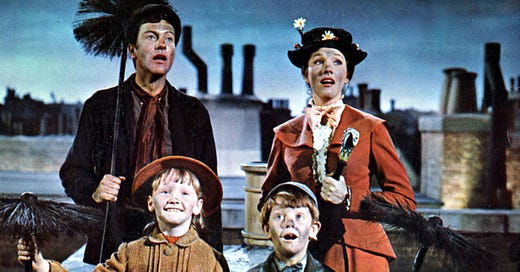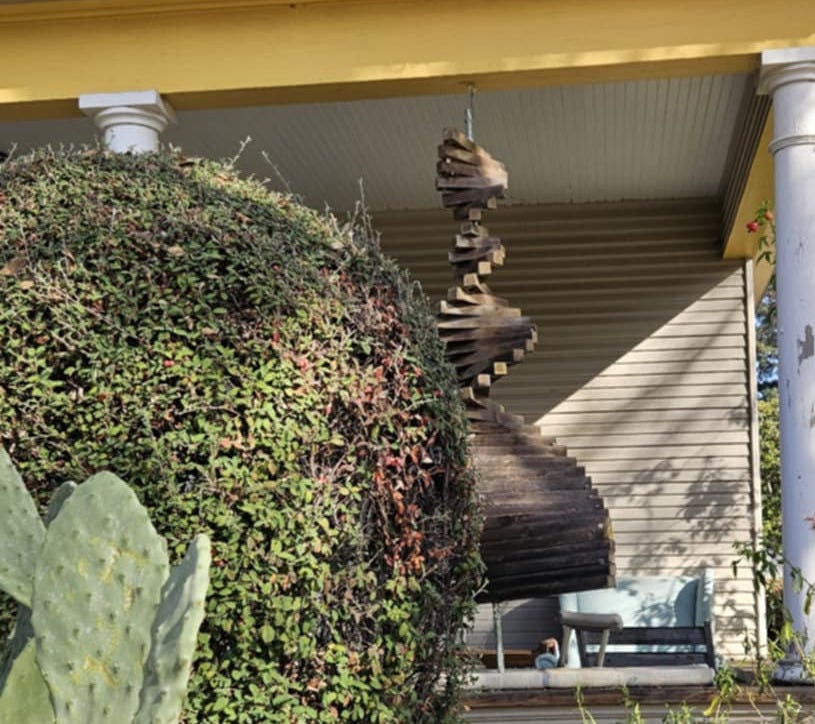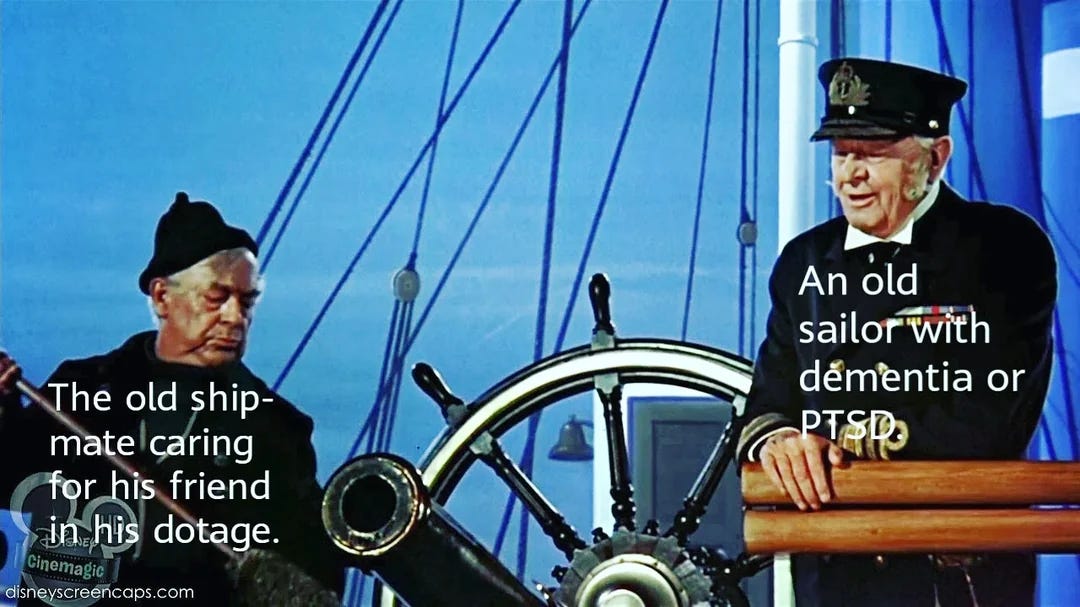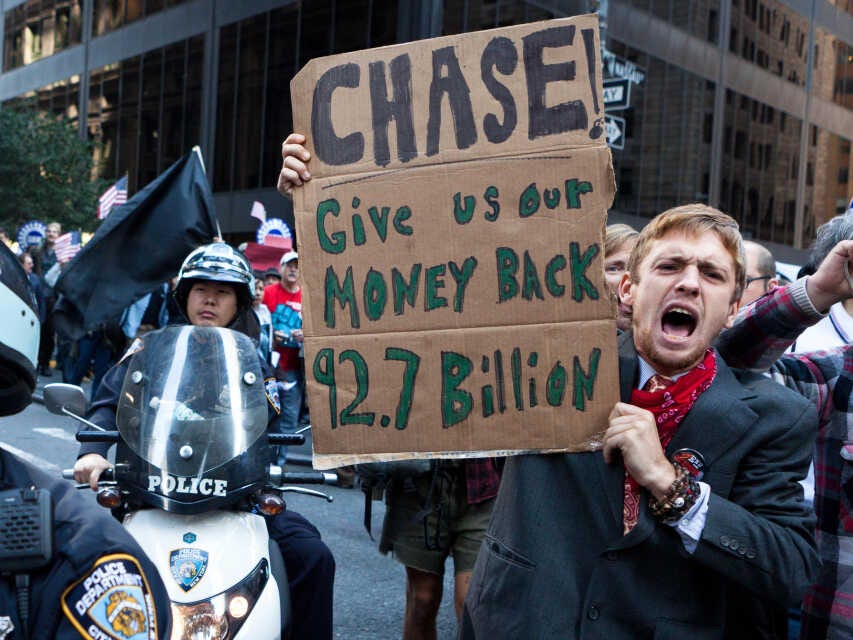This year I felt so low about the world, so very un-festive, that I couldn’t bring myself to get a Christmas tree. For a long time I have been really perturbed by the sight of all the dead trees at Christmas tree lots, anyway, and renting one (my usual method) was going to cost $200, so instead I decided to make one instead. This was prompted in part because my Dad used to do it: after my siblings and I moved out of our house permanently, and until they had grandchildren, my parents would always just put up something my Dad had built in the backyard.
My Dad was very handy, and I am the opposite of that, but I perused the interwebz for ideas and ended up making my tree out of two upside tomato cages, some twine, and a bunch of fir tree branches I got from the lot down the street. It’s nowhere near as nice as anything my Dad would have done, but it looks OK, I think. It does the job. Then I cleaned out my cookie cutter drawer of all the rusty ones, shapeless ones or dupes, took them to my mom’s care home, and painted them with her for decorations. It’s going to be a jenky Christmas at my house, but I think low expectations are probably the best way to go from here on in.
Sorry to be a downer. Truly, I think what I am hoping for is a return to D.I.Y. in the coming years. It seems like the only solution to the enshittification of everything. You know how Jacques Attali once said, “Music is a herald, for change is inscribed in noise faster than it transforms society?” Music heralded the movement called DIY back in the late 70s and 80s, when popular music felt too clean and automated to people (but my god, they didn’t have a clue how automated it could get!). One response to the shiny nature of music back then was punk, and later, indie rock: punk posited that people didn’t have to be accomplished musicians to play their instruments and write songs, and the indie movement created a small business model for music distribution which emphasized personal taste over mass marketing. (The company Sub Pop was the apex of this.) Going on the herald supposition, perhaps that’s a way back to the garden, though I am not going to hold my breath.
In the meantime, I am still unable to muster an interest in Christmas, but nevertheless, I went to see “Mary Poppins.” Being a Disney product, it’s the opposite of DIY, and it doesn’t have actual Christmas in it, but it does take place in Ye Olde Englande and it reminds me of my childhood so, close enough. Also, it was playing at the grand old theater near my house, where there’s a pipe organ and $1 popcorn, so what the heck. I had to go alone though. My daughter wouldn’t come with me because she said it was too long and confusing.
Confusing? Mary Poppins? But when I watched it again – for the first time in decades – I saw what she meant. I was too little to see the film when it came out, but we had the record and I listened to it nonstop; much like Tom Lehrer, the songs are full of words and expressions I didn’t know at the time, suffragette, indubitably, fiduciary, apostle…the list goes on and on. I doubt a kid today would have the patience for all that, but even more off-putting to a modern-day person is just how completely antithetical its ethos is to the zeitgeist of now. “A Spoonful of Sugar” – apparently inspired by the method of administering the polio vaccine -- may advocate that all labor should be undertaken with a good will, however awful, but as an adult it’s easy to see that really the whole movie is one long rant about how bad capitalism is.
Capitalism, and imperalism. And it’s pretty explicit about it actually: like the whole Admiral Boom business – that’s the man who sits on top of his house and sets off a cannon every night – made no sense to me as a child, but in retrospect I see he represents the warlike past of Britain and how useless and noisy and crap it all was. I like to think it was also a reminder that, since “Mary Poppins” takes place in 1910, the odds were that within six years Bert will be lying dead in a trench in France. (Michael, luckily, will probably just miss it.)
Meanwhile, however – in the world of Edwardian London, just before the fall -- Mary and Bert are working-class heroes, with Bert anticipating the gig economy as he works three jobs to make ends meet: street artist, busker, and chimney sweep. (Bert is a cockney, as the song-and-dance “Step in Time” emphasizes: it’s based on the slightly dirty cockney ditty “Knees Up Mother Brown.”) He works for tips, basically – like content creators on Instagram – but he embodies an imaginary ideal, the wise and charming, non-toxic, male figure. There’s one scene in particular where he cajoles Mr. Banks into being a good father, and there’s another one where he tells the kids that the reason their dad is such a dick is because he has no one he can cry to, so he has to bottle up all his feelings.
Meanwhile, the Banks’ kids’ mom is a suffragette who is constantly rushing off in order to throw things at the Prime Minister and support her sisters who are currently in prison. She yells “Votes from Women!” at the slightest provocation and sings,
“Though we adore men individually/We agree that as a group they're rather stupid.”
This seems kind of radical sentiment for a Disney film, but it’s not as radical as the film’s denouement, which comes when Michael refuses to invest his tuppence in the bank, after having been encouraged to do so by a group of elderly bankers, thusly:
When you deposit tuppence in a bank account
Soon you'll see that it blooms into credit of a generous amount
Semiannually
And you'll achieve that sense of stature As your influence expands
To the high financial strata That established credit now commands
You can purchase first and second trust deeds…
Think of the foreclosures!
Bonds! Chattels! Dividends! Shares!
Bankruptcies! Debtor sales!
Opportunities!
All manner of private enterprise!
Shipyards! The mercantile!
Collieries! Tanneries!
Incorporations! Amalgamations! Banks!
After hearing this, Michael still prefers to give it to the poor bird lady, causing a run on the bank, and his dad to be fired.
Of course, being Disney, they take it all back in the end, but somehow the message still stands: banks suck, war sucks, imperialism sucks, and women should have the vote. All of this is so nice and interesting to see as a grown up, but it’s also a little sad because almost everything it talks about hasn’t changed one whit. Women are still fighting for their rights, banks are still ripping everyone off and delighting in foreclosures, artists like Bert are scraping by with menial jobs, and Disney is still churning out a twisted vision of society for us to yearn for. Or against, if you’re me, but even I can find some comfort, at least in this small shard of it.









